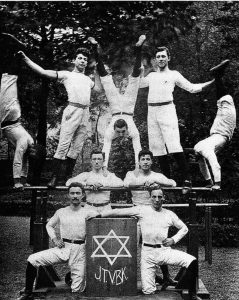Once again, the LBI New York has opened its treasure chest for an exhibition tracing the development of Zionism among German-speaking Jews from a utopian dream to a matter of survival. Until the end of August, the Center for Jewish History shows how their intellectual and organizational legacy contributed enormously to the eventual founding of the Jewish state: “If you will it, it is no dream”…

© Leo Baeck Institute New York
A Jewish homeland? A refuge from anti-Semitism! A place for Jewish religion and culture to flourish! What an idea, especially for the millions of impoverished Jews in Eastern Europe in the 19th century, subject to pogroms and the arbitrary rule of the Czar. The roots of the modern Zionist idea, however, run even deeper in the relatively affluent and assimilated communities of Jews in German-speaking lands than in the Shtetl culture of the Pale of Settlement. At the Center for Jewish History in New York, an exhibit created by the Leo Baeck Institute traces the development of Zionism among German-speaking Jews from a utopian dream to a matter of survival.
By the second half of the 19th century, Jews in the Habsburg and Hohenzollern empires were well along the path of assimilation. The cradle of Jewish Enlightenment, or Haskalah, had been Berlin, and Jews in the German sphere had taken its values to heart by learning German, reforming religious practice, and embracing secular education, or Bildung, as a universal value.
At the same time, romantic nationalist movements linked the struggle for liberal reforms with the idea that sovereignty was the right of free peoples united by a national heritage. German Jews were deeply involved in these movements – civil rights for Jews were among the demands of the failed revolution of 1848 – and soon Jewish thinkers began to apply similar ideas to the Jewish people. If the German people deserved self-determination in a national homeland, then why not the Jews?
These liberal and nationalist political movements contributed to the gradual emancipation of Jews in Germany and Austria, so that by the time Germany was unified in 1871, Jews across Central Europe enjoyed full rights of citizenship and prospered to an unprecedented degree.
Nevertheless, two factors coalesced to stoke the dream of a different Jewish future among some intellectuals. First, the situation of Jews in Eastern Europe was little improved, and some were concerned for the welfare of their brethren in the Russian Empire. Second, and closer to home, nationalism and emancipation had failed to extinguish prejudice but rather gave rise to a more virulent strain of anti-Semitism that was typified by the wrongful conviction of French Jewish artillery captain, Alfred Dreyfus, for espionage in 1894.
Dreyfus Affair
German-speaking Jewish thinkers – messianic rabbis, socialist utopians, and Jewish cultural partisans – had already proposed a Jewish homeland in Palestine, and even coined the term “Zionism”, but the idea and the movement crystallized around the peak of the Dreyfus Affair in 1896, when the Viennese journalist Theodor Herzl published The Jewish State. Herzl was a typical assimilated Austrian Jew whose journalistic interests had not been particularly Jewish, or even political, but the experience of life under Vienna’s anti-Semitic mayor Karl Lueger and the false prosecution of Dreyfus galvanized him. The issue of anti-Semitism would not be solved even in the “civilized” countries of Western Europe until the Jews had a homeland, he now argued.

© Leo Baeck Institute New York
In the ensuing decades, Zionism would remain a primarily German-speaking movement. The early Zionist Congresses moved between Basel and a series of other German-speaking cities. German was the language of the Zionist movement and its administration was headquartered first in Vienna, then in Cologne, and finally in Berlin. The Zionistische Vereinigung für Deutschland (Zionist Union for Germany, ZVfD), founded in 1897, was a crucial source of financial support for the International Zionist movement.
As rooted in German-speaking culture as it was, the Zionist movement never found mainstream support among German Jews. Plans to hold the first Zionist Congress in Munich were scuttled when the local Jewish Community protested a movement they viewed as “antithetical to the spirit of Judaism,” according to an editorial in the local paper. “The Jew identifies with his fatherland and becomes absorbed by the nation in whose midst he lives,” was the official position of Jewish community leaders in Munich. Left out of the official position statement, but much discussed, was the notion that such troublemaking would only provoke the anti-Semites. The Central Association of German Citizens of the Jewish Faith, or Central-Verein, approached Zionism with essentially the same attitude, instead of pursuing a strategy of defending Jewish civil rights in courts of law and touting the contributions of Jews to German society in the court of public opinion. The Orthodox rabbinate, except for a small minority of supporters, condemned Zionism as incompatible with the universality of the Jewish religion.
Although Zionism never became a mass movement in Germany or Austria, the early days of political Zionism were firmly rooted in the German-speaking world. Apart from ZVfD, other Zionist organizations also retained a firm, if marginal place among German-Jewish communities throughout the early 20th century. The “Blue and White” youth and sports organizations and agricultural training camps known as Hachsharot worked to foster a generation that was up to the challenge of Jewish nationhood, and Zionist newspapers like the Robert Weltsch’s Jüdische Rundschau advanced the intellectual project of Zionism.
World War I transformed the political landscape of Europe and the course of the Zionist movement as well. After the war, the leadership shifted mainly to Eastern European leaders such as Chaim Weizmann, a British citizen of Russian origin. The end of the Ottoman Empire and the Balfour Declaration of 1917 brought an end to the dominant organizational role of German-speaking Jews, but their intellectual and organizational legacy contributed enormously to the eventual founding of the Jewish state.
Even for committed German and Austrian Zionists, the thought of abandoning a comfortable German cultural landscape for an uncertain future in the desert held little appeal, and relatively few emigrated to Palestine through the 1920s. That changed with the rise of the National Socialists in 1933, when increasing persecution led significant numbers of German Jews to reconsider the idea of a Jewish homeland as a matter of survival. No longer just a dream, but not yet a state, Palestine had become a real place of refuge.
William H. Weitzer is Executive Director of the Leo Baeck Institute New York Berlin
